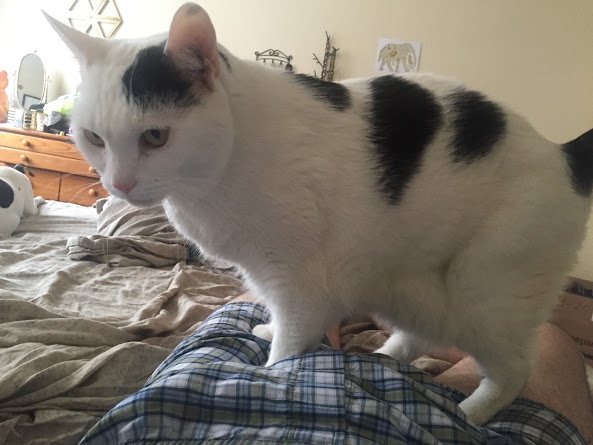May 25
Yesterday, May 25, was maybe the best day of the last two weeks.
On May 25, I took Julie to the veterinary oncologist.
The news, well, it was the news. It was not good news, but I knew that it would not be good. At least it was news.
She has advanced squamous cell carcinoma in her right jaw.
The oncologist recommended an x-ray and staging tests to make sure the cancer has not spread. The lungs and lymph nodes are of particular concern.
Surgery, the oncologist says, is not an option. It would require removing a sizable portion of her jaw, which cats do not tolerate well. It would only be a matter of time before she stopped eating.
Surgery is viable in less than ten percent of cases. By the time the cancer is detected, it’s too late for that.
Radiation can address the bone pain. Alternately, an oral chemo drug can slow down the progression of the tumor.
The prognosis is 3-6 months.
But with treatment, she can feel better for those months.
I asked about steroids.
“Steroids can help from an anti-inflammatory perspective,” she said, “and if Julie is not eating well, they can also boost her appetite. But they are not a treatment for the tumor itself, just for the symptoms.”
For carcinomas, the oncologist advised thatch uses a non-steroidal anti-inflammatory drug. Older cats, like Julie, sometimes show evidence of kidney disease, which can be exacerbated. But her kidney values appear to be in the normal range.
The oral chemo drug is Palladia, which is to be given by mouth every other day. It can slow down the tumor’s growth or, in a best case scenario, reduce its size; and the drug is well-tolerated in cats.
For today, she will get: x-rays, a urine sample, an antibody injections (that’s for a blooming UTI — a recurrent problem for her over the years, and the last thing we needed right now, of course), and the first dose of Palladia.
We schedule a telehealth consultation and a CT scan for radiation.
The first round of radiation can reduce the tumors size and buy her time, but, I am told, it is a short-term solution. The radiation will affect the health tissue near the area, such as her gums and skin. Those tissues have their limits until they incur side effects.
And of course, there is her happiness.
How happy will she be undergoing all this?
I wish I could know the answer to that.
As I drove home, Julie sitting shotgun in her carrier, I felt an odd surge of optimism. Three to six months is a tragically short time, but the thought of getting six months with Julie feels like a gift today, one I don’t feel I deserve. If she is healthy and comfortable for those six months, what more can I ask for?

Comments
Post a Comment